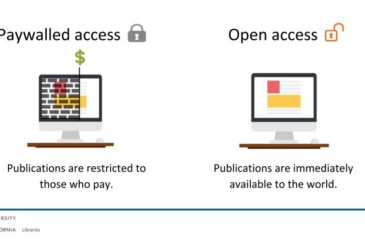Post Tagged with: "Publisher Negotiations"
-
Fact check: What you may have heard about the dispute between UC and Elsevier
The UC Negotiating Team Ivy Anderson, (Co-Chair), Associate Executive Director of the California Digital Library; Jeffrey MacKie-Mason (Co-Chair), University Librarian and Professor, School of Information and Professor of Economics, UC Berkeley; Günter Waibel, Associate Vice Provost and Executive Director of the California Digital Library; Richard A. Schneider, Associate Professor, Orthopaedic Surgery, UC San Francisco and Chair, Academic Senate University Committee on Library and Scholarly Communication; Dennis J. Ventry, Jr., Professor of Law, UC Davis and Vice Chair, Academic Senate University Committee on Library and Scholarly Communication August 2, 2019 Whether you have received an email directly from Elsevier, or have […]
-
Exciting Changes Ahead: Publishing Your Articles in Cambridge University Press Journals
In April 2019, University of California (UC) and Cambridge University Press announced that they had entered into a transformative open access agreement that will give UC authors who publish with Cambridge the opportunity to make their research freely available and advance the global shift toward an open access future for research. The agreement will also maintain UC’s access to Cambridge’s more than 400 journals. If you are a UC author, you will soon begin to see some changes from Cambridge after they have accepted your article for publication. Here is an explanation of those changes, and an overview of the […]
-
Update on open access and academic journal contracts: a presentation to the UC Board of Regents’ Academic and Student Affairs Committee
On July 17, 2019, Acting Provost and Vice Provost Susan Carlson, University Librarian and Chief Digital Scholarship Officer Jeffrey MacKie-Mason, and Associate Vice Provost and Executive Director Günter Waibel briefed the UC Board of Regents’ Academic and Student Affairs Committee on open access and academic journal contracts. The video archive of the presentation is available on YouTube and below. A copy of the presentation script is also available for download.
-
You’re invited to the Open Access Tipping Point Public Forum!
The University of California (UC) will be hosting an Open Access Tipping Point Public Forum in Washington, DC on August 29th from 2:00-4:30 pm EDT. This free, interactive public event is intended to advance understanding of the value and opportunities associated with negotiating, participating in, and supporting transformative open access agreements for all stakeholders in the scholarly publishing community – publishers, societies, funders, libraries, and academic authors. We hope you’ll join us! Update, August 20, 2019 We are excited to share these important updates about the Open Access Tipping Point Forum. 1. Livestreaming: Interest in the Open Access Tipping Point […]
-
Announcing the Open Access Tipping Point Workshop, co-sponsored by the UC Academic Senate & Libraries
The University of California (UC) is pleased to announce an invitational workshop in Washington, DC, August 28-29, for North American institutions motivated to refactor their current, big-deal commercial publisher agreements to support a sustainable open access transformation. The Open Access Tipping Point workshop is co-sponsored by the UC Academic Senate and Libraries and will be facilitated by members of UC’s negotiation team and publisher task force. Also in attendance will be representatives from Germany, Hungary, Norway and Sweden who have experience with negotiating transformative agreements, coalition building, and principled walk-away strategies. The workshop will build on UC’s recently released negotiation […]
-
UC launches toolkit for negotiating transformative agreements with scholarly publishers
Following the 2018 release of the provostial Systemwide Library and Scholarly Information Advisory Committee’s Call to Action, the University of California (UC) Academic Senate and Libraries partnered to utilize publisher negotiations to address the issues of journal subscription affordability and open access (OA) transformation. UC’s publisher negotiations have since been closely followed around the globe. In the United States, UC’s actions and stance, particularly with Elsevier, have prompted a national conversation about how research institutions can restructure their publisher contracts in the service of OA publishing. While UC has not yet secured a transformative agreement with Elsevier, the university has […]
-
Cambridge University Press and the University of California Agree to Open Access Publishing Deal
The University of California and Cambridge University Press have entered into a transformative agreement that will advance the global shift toward an open access future for research. The agreement is designed to maintain UC’s access to Cambridge’s journals, while also supporting open access publishing for UC authors. The partnership is UC’s first open access agreement with a major publisher, and Cambridge’s first such deal in the Americas.
-
Open Statement: Why UC terminated journal negotiations with Elsevier
March 20, 2019 (revised April 25, 2019) The University of California has taken a firm stand on both open access to publicly funded research and fiscal responsibility by deciding not to renew its journal subscriptions with Elsevier, the world’s largest scientific publisher. Here’s why: Elsevier’s proposal Under Elsevier’s proposed terms, the publisher would capture significant new revenue on top of the university’s current multimillion-dollar subscription while significantly diminishing UC’s rights to Elsevier content. Elsevier’s latest proposal, dated January 31, 2019, did consider some of UC’s conditions, including providing UC authors with open access publishing options across much of the publisher’s portfolio of journals. […]
-
UC and Elsevier – March 2019
Note: this is a copy of the “UC and Elsevier” page on this site as it appeared March 6, 2019, maintained as an archive. March 2021 and October 2019 versions are also available. For current information about UC and Elsevier, see the actively maintained page. UC terminates subscriptions with Elsevier in push for open access to publicly funded research As a leader in the global movement toward open access to publicly funded research, the University of California is taking a firm stand by deciding not to renew its subscriptions with Elsevier. Despite months of contract negotiations, Elsevier was unwilling to […]
-
UC and Elsevier: Why It Matters
This is a copy of the “UC and Elsevier: Why it Matters” page on this site as it appeared in June 2020, maintained as an archive. For current information about UC and Elsevier, see the actively maintained page. Following UC’s break with Elsevier, messages of support from around the world pour in On Thursday, Feb. 28, the University of California announced its separation with Elsevier, one of the world’s largest — and most profitable — publishers of academic research. In the days since, messages of support and congratulations have come pouring in from around the world. Here is a sample of the […]






